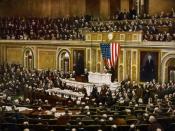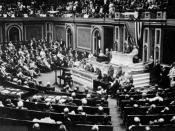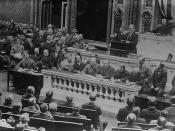As the Great War between the Allied and Central Powers continued in Europe, the debate over American presence in the war and President Woodrow Wilson's declaration of neutrality thrived as a strong issue throughout the country. More issues began to add up in the minds of politicians, urging them to discard neutrality, support the Allies, and declare war on Germany. President Wilson began to make pro-Allied idealistic statements stating that a German victory would destroy free enterprise and government by law and that only the Americans could end the Great War and prevent future wars against democracy. Another strong reason for choosing the Allies over the Central powers included the strong American economics ties with England rather than Germany. The most prominent reason for American interest in the war was Germany provoking American anger and action by sinking merchant trade ships via U-boats and killing Americans. Though Germany agreed in treaties and was ordered by America to stop unwarned sinking of merchant ships, they did not stop and Americans pushed for action against the German naval policy which stated that all merchant ships are subject to attack.
Thus, America held a cultural, economic, and diplomatic grudge against Germany and Congress declared war in 1917.
Woodrow Wilson as president was overall very apprehensive about getting directly involved in European diplomacy and tended to keep his "Wilsonianism" as his main focus. This term generally describes Wilson's beliefs in internationalism and exceptionalism. He believed that only the United States could lead the world into a new era of unobstructed commerce, unexploited capitalism, and open diplomacy. He also believed that all empires should be dismantled in order to honor self-determination as well as reducing armaments. His idealism was based on morality and progressive ideals and it seemed to him that Britain, not Germany,


